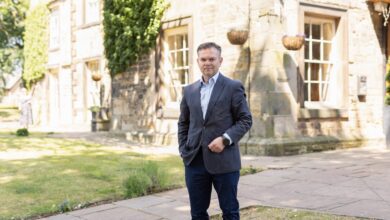Encourage your aspiring managers to undertake a diploma
According to government statistics, 70% of hospitality and tourism businesses offer training, yet there is a barrier to skills development in training ‘not being sufficiently targeted’ – here’s where the Master Innholders could help

The UK workforce employed in the hospitality and tourism sector sits at roughly 8%, according to the government, of which 86% is employed in either a restaurant, pub or hotel-related business.
The government, along with input from the ONS, also states that 45% of this sector’s workforce is employed in roles where staff behaviours – rather than “high technical competence” – make the crucial difference to a great customer experience. It was noted that this was high compared with other industries in the UK.
Roles such as bar staff, waiters and waitresses, and kitchen porters, reportedly have 32% more ‘elementary’ roles than average, as defined by the ONS. With that said, we shouldn’t underestimate the need for qualifications and training where possible to encourage career development within hospitality.
UKHospitality has found that more than 660,000 jobs have been lost over the course of the pandemic, which has left approximately 400,000 open vacancies across the industry just waiting to be filled.
In light of this, the industry body says: “We need to take action to save jobs and protect businesses. It’s our aim to recruit and retain talent back into the industry and to distinguish hospitality as a career of choice.”
UKH has long advocated for the sector and urged the government to take notice of its crisis, while also launching its own 12-point employment plan.
However, more specifically to the hotel industry, the Master Innholders have been running their own course – The Aspiring Leaders Diploma – for the past 11 years, with the 11th cohort being instructed right now.
The importance of being specific in training cannot be overstated, as the government states that a barrier to skills development lies in training “not being sufficiently targeted”, both in terms of topics covered and where it is offered, which the government conceded adds to “specific regional issues”. This is despite 70% of hospitality and tourism businesses offering training, a statistic that the government noted is in line with the overall average for all UK industries.
The Aspiring Leaders Diploma is for hotel managers and offers a 12-month development experience, comprising eight modules that take place every six to eight weeks across the UK in “esteemed” hotels such as Brown’s in London.
The diploma, which is also endorsed by the Institute of Hospitality and linked to the Institute of Leadership and Management Level Three Award, is led by fellow hoteliers with decades of knowledge and experience in the industry.
One of the course leaders, Hilary Cooke PhD. FIH. MI, says: “The course was started in an effort to increase retention of young managers in the hotel industry, so to keep people in the industry and to eventually develop them into Master Innholders and general managers of hotels.”
Over the years, the diploma has become renowned among hoteliers not just for what it offers hoteliers-in-training, but also because of its exclusivity; only about 180 people have been invited to the diploma and have completed this course over its 11-year span, according to Cooke. As a result, interviews for applicants are also only held once a year in March at the Innholders’ Hall.
Cooke continues: “They’re interviewed by a panel of four in a speed-dating set-up by four different course leaders for five minutes at a time.
“In the interviews, they are looking for those among the applicants that are most enthusiastic about developing to [the Master Innholder] level. Also that they are keen to be in charge of a team of people, and that they have an aspiration to become a general manager.”
The current cohort has 18 students enrolled, who have been working in a team management position in a hotel or hospitality establishment that has accommodation at the time of their application. This round of the diploma will finish next year.
“It’s evolved in the way we keep up to date with developments in technology in the industry,” Cooke says. “We update the content of the course to reflect these changes, but the structure of the course has stayed the same.”
The course itself is concerned with professional development, personal development, marketing, finance, operations management, customer service, operations, and management.
Adam Hersey, alum of the diploma, and sales and events manager at Herbert Berger, Innholders Hall, said of his time on the course: “I often reflect on my time on the course with much pride and joy. Experiencing some of the most beautiful hotels in the country not only enhanced my knowledge of practical disciplines, but also helped me grow as a person.
“I cannot stress enough what a special opportunity MIALD is. I urge aspiring leaders to apply and established leaders to support them in doing so.”
Among the 18 undertaking the diploma this year is Daniel Johnson, The Rise restaurant manager at The Grand, York, where he has worked for about 15 months.
Having worked in hospitality for almost seven years, he has climbed the ladder of seniority in restaurants of hotels in York and Durham. After finishing his A-Levels, instead of pursuing university Johnson decided to aim for a supervisory position and has worked full-time ever since and always aiming for leadership positions.
The latest cohort of the diploma have completed the first block of their 12-month endeavour in May. Though quite introductory in nature, Johnson recounts what an impact the experience of meeting his other peers has had on him.
“It was so comforting to speak to and work with so many like-minded people that are in a position so similar to yours,” he says. “I’ve never been in a room with 18 other young professionals who have these aspirations within the same industry, and who are also really nice people.”
He continues: “I’ve never had that luxury and I don’t think a lot of people do. One of the reasons why this diploma is so good is because it unifies these people that want to reach a management position within hotels.”
The first block of the diploma was held at the five-star London hotel, Mayfair Townhouse, where the students – for a lack of a better word – started their workshops that were scheduled over the span of two days. Workshops were led by Hilary Cooke, and according to Johnson, “she does an absolutely fantastic job”.
He says: “There’s a lot of different team working activities and lots of constant rotating, so you get the opportunity to work with everyone. The course leaders also test out different styles of learning, whether it’s doing presentations, classroom, whiteboards, team activities to really keep you engaged and to take all this information.”
The diploma has received the Princess Royal Training award for two years in 2018 and 2021, meaning it has been noticed as a sign of prestige throughout the industry – particularly for those who aspire to become Master Innholders.
For those seeking out this qualification, attaining a spot as an alum further strengthens their credentials and validates their passion for the industry.
“I would like to think that people would look favourably upon the diploma, because it’s a relatively exclusive and selective group,” Johnson adds. “But on the networking side of it, you get to meet so many more people, which will keep so many more doors open. If I want to move from York to London, I could speak to 20 or 30 people about opportunities.”









